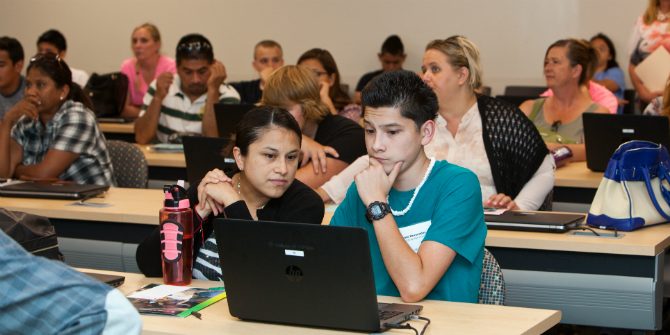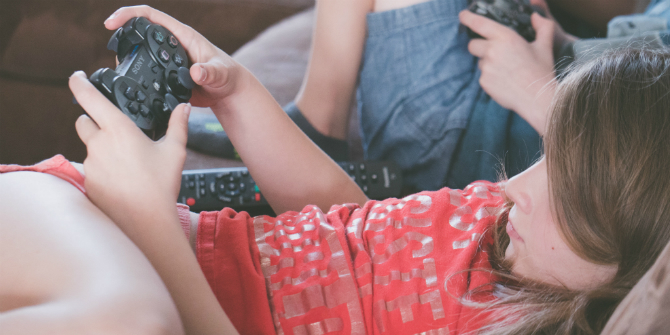 After 100 days of ‘lockdown’ few parents would deny the anxiety that exists over our children’s futures: missed schooling, no socialising, uncertainty over ‘the new normal’, and assuming every other parent is handling things 100 x better. But what resources do we have at our disposal to address these concerns? For www.parenting.digital, Naomi Hodgson and Stefan Ramaekers discuss the use of digital forms of parenting support and how the datafication and algorithmic personalisation of parenting shifts decision-making and transforms the way we relate to our children and to ourselves as parents.
After 100 days of ‘lockdown’ few parents would deny the anxiety that exists over our children’s futures: missed schooling, no socialising, uncertainty over ‘the new normal’, and assuming every other parent is handling things 100 x better. But what resources do we have at our disposal to address these concerns? For www.parenting.digital, Naomi Hodgson and Stefan Ramaekers discuss the use of digital forms of parenting support and how the datafication and algorithmic personalisation of parenting shifts decision-making and transforms the way we relate to our children and to ourselves as parents.
We are much more aware of the impact of upbringing on our children’s futures than our parents or grandparents were. Perhaps unsurprisingly, then, we are drawn to expertise that offers solutions: to address daily parenting problems, to ensure our children’s optimal development, to prepare them for the future. A growing marketplace now provides such guidance: tv shows, books, online forums, courses and more recently – parenting apps. But these apps are not just an alternative medium through which to access expertise. They mediate the parent-child relationship in specific ways.
The art of learning
The increased focus on ‘learning’ in educational and social policy renders parenting as yet another skill to be mastered. Early 21st century forms of governance call for us to develop skills of adaptability and resilience to deal with today’s precarious conditions and prepare for an uncertain future. The focus on learning as key to adaptability and future success draws evidence predominantly from the learning sciences, developmental psychology, and increasingly educational neuroscience, which identify not only how we learn but also those aspects of learning and development most pertinent to future emotional and economic stability. How and what we are advised to learn now is increasingly concerned with a future state.
This is where ‘parenting’ fits in. As a verb, it is something we do, to our children. It is something we can learn to do and learn to be better at. And who wouldn’t want to get it right? Who doesn’t want the secret to happy children who in turn will, the advice suggests, become happy future adults? But understanding the relationship between parents and their children in this future-oriented way overlooks a lot of what goes on in the present of the intergenerational relationship. When we raise children we are initiating them into the practices of our culture and society: how we eat, dress, keep clean, address others, treat people, our rituals and traditions, what they can and can’t watch, hear, listen to, and so on. In doing so, parents pass on, implicitly and explicitly, values. They inevitably represent what they value of the world.
This existential register of what it means to raise children is largely absent in the ‘parenting’ account of raising children, which predominantly focuses on offering parents strategies for optimising developmental outcomes – preferably during those magic first 1000 days – and minimising risk. The language of ‘getting it right’, backed up by science (and therefore supposedly free of values), implies a causal relationship between parenting and learning outcomes, between present and future. Overall, we see an investment-oriented understanding of the parent-child relationship: evidence-based investment for optimal learning outcomes; risk eliminated.
‘Datafying’ the parent-child relationship
The message that there is a ‘right’ way to do it gets a particular twist when communicated via parenting apps. From trying to conceive, through pregnancy, birth, and the early years, apps offer daily information and advice – on sleeping, feeding, teething and so on – and age-appropriate developmental games and activities. Apps often work in similar ways to social media, so users can share photos, connect with friends and family, and see timelines and graphs that visualise their child’s progress. As users can record key information that aligns with what healthcare professionals will need during routine appointments, an app can be a source of support and reassurance for new parents as they can show evidence of their activities and progress. Research with app users has shown that, in doing so, they are able to “verify their own practices as being correct and ‘okay’.” An app can distil the overwhelming amount of information available to new and expectant parents in to what is essential and relevant, with the reassurance that it is scientifically verified, provided by experts, and often endorsed or co-designed by public health authorities.
So, parenting apps have a unique selling proposition compared to the existing media for parents: the information and advice you receive is ‘personalised’. On the basis of the data entered, the app can offer content ‘tailored’ to you and your child. The way apps work to provide information and advice through the interplay of user data, algorithms, and specific bodies of scientific knowledge, however, raises questions about where the decision-making agency lies in the parent-child relationship. Whereas books or tv programmes show us generalisations from which we have to decide how or whether they work for us, an app gives us a ‘datafied’ picture of our parenting produced in relation to particular goals and expectations embedded in the app’s software. Our performance is visualised in charts, graphs, and timelines, generated by algorithms working on a fixed body of knowledge. Although legitimate knowledge in itself, it is a very narrow frame through which to understand my child and myself as a parent. Who I am is largely left out of the picture.
This scientific ‘parenting’ picture cannot account for the existential register of raising children, and even less so when the scientific knowledge is ‘algorithmicized’ in an app. What cannot be entered as data – so, cultural norms and values – can’t be part of the picture. What it means to raise children is further narrowed to a data-based relationship between the user (parent) and the app, shifting decision-making agency to the app’s algorithm.
Appeasing uncertainty
The appeal of personalized advice, on hand day and night, makes sense. Raising children has always been fraught with uncertainties about how to do it ‘right’; our current conditions are only exacerbating this. It is perhaps indicative of an instrumentalized understanding that the alternative to ‘parenting advice’ is seen as ‘leaving it to chance’ (and, therefore, as irresponsible). There is a need for meaningful material and emotional support for parents, but currently, what it means to provide this is talked about in a very narrow register: as parents we are both a source of risk to our children and the means to their future flourishing. And the knowledge and expertise we are offered to mitigate risk and optimize outcomes derive from very specific scientific fields. These have their place, of course. But the term ‘parenting’ captures a quite specific way of relating to our children and to ourselves as parents. Parenting apps risk intensifying this, enclosing the user in a permanent feedback loop.
While we all need to block out the noise sometimes and find a quick solution, the noise is the basis on which we make our decisions: our values, morals, beliefs. Sometimes long-held and instinctive, sometimes judgments made on the spur of the moment. Sometimes the noise is overwhelming, but its general existence is evidence that we are making judgments all the time, in the face of new disruptions to our expectations, often with no previous experience to draw on. To speak of raising children rather than ‘parenting’ opens up how we can talk about what we do and who we are, beyond what can be datafied: from the personal, to the public and political; from parenting for a digital future to being a parent in a digital present.
First published at www.parenting.digital, this post gives the views of the authors and does not represent the position of the LSE Parenting for a Digital Future blog, nor of the London School of Economics and Political Science.
You are free to republish the text of this article under Creative Commons licence crediting www.parenting.digital and the author of the piece. Please note that images are not included in this blanket licence.
Featured image: photo by August de Richelieu on Pexels





